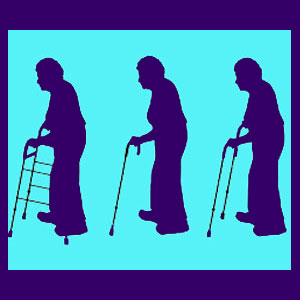
Elderly back pain is always possible to experience as we age. Getting older creates degenerative effects on our bodies. It is typical for age to cause us many minor aches and pains. Some symptoms are normal, while others can be debilitating. Many back ache conditions can be created, or worsened, by age.
We must all get older, but with proper preparation, we can reduce the probability of severe back pain later in life. It should be noted that severe and chronic back pain in the elderly is statistically far less common than it is for adults in the ages of responsibility (26-55). Of course, spinal deterioration is one of the most implicated of all back pain causes and in the elderly, this degeneration is at its height compared to younger victims of chronic back ache. This is yet another piece of supportive evidence explaining why most normal spinal degeneration is not causative for pain.
This essay details the unexpectedly low incidence of chronic back pain in seniors.
Elderly Back Pain Problems
The following conditions can be created, or worsened, by the aging process and may be causative or contributory to the symptomatic expression:
Osteoporosis creates weak and porous bones. This condition can facilitate easy fracture or even complete spinal instability in severe cases.
Vertebral fractures are a common result of low bone density in elderly patients. Compression fractures may or may not be symptomatic.
Osteoarthritis can create pain in many areas of the body, including the spine. Arthritic debris is the main source of elderly central spinal canal stenosis. Bone spur formation in the vertebrae may lead to neurological impairment or mechanical pain.
Degenerative spondylolisthesis is sometimes a result of severe spinal deterioration. Mild and moderate cases are typically not problematic, but grade 3 or 4 cases may cause serious health concerns and even complete disability in some patients.
Degenerative disc disease is a normal part of aging. It is often not symptomatic, but can increase the chances for herniated discs to occur in affected levels.
Spinal stenosis is common in elderly people. Stenosis may or may not cause pain. Spinal stenosis can also cause neurological impairment. The lumbar and cervical regions are typically affected by stenotic change, regardless of the incidence of symptoms.
Pinched nerves can be caused by spinal stenosis, spondylolisthesis, bone spurs or spinal curvature, among other possible sources.
Adult scoliosis can result from years of wear and tear on the spine. This curvature may compromise the integrity of the central canal or decrease the size of the neuroforaminal spaces.
Prevention of Back Pain in the Elderly
It is important to maintain good general health throughout an entire lifetime. It is much easier to prevent back pain than to treat it once it has become crippling. There is no way to guarantee pain-free twilight years, but with a few guidelines, you can stack the odds in your favor.
Eat healthy. Include proper nutrition, including calcium, magnesium and vitamin D for strong bones starting at a young age.
Stay active. Regular exercise at all ages is important for strong bones and muscles. Your physician, physical therapist or fitness trainer can help design a sensible exercise program at any stage of life.
Do not abuse your body. Drugs and smoking are bad for you. Alcohol in large quantities is also detrimental to your general health.
Keep a healthy state of mind. Psychological back pain is very common and can make life a nightmare at any age. In fact, many mindbody doctors speculate that a primary source of chronic elderly back pain is the simple anger which often accompanies aging. Coming to terms with one’s own mortality can be a terribly infuriating process for the subconscious mind.
Suggestions for Elderly Back Pain
We must all eventually get old. Young people feel that they will never get old. Middle aged people feel they are far from old age. Elderly people wonder how they got this old and how their lives went by so fast. The alternative to old age is to die young and that is no solution.
Take care of yourself right now. Do not wait any longer to be as healthy as possible. Do not put off till tomorrow what you should have done yesterday. Good health should be a lifelong consideration. Take care of your body in every way. You owe it to yourself and to those who love you. Make your golden years sparkle, rather than be tarnished by chronic back pain. Work every day to stay one step ahead of potential back problems in your future.
Remember, it is later than you think.
But, it is never too late.





